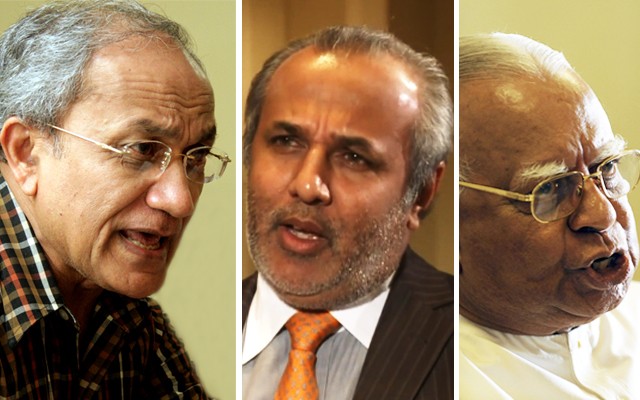In a previous discussion, I dealt with the mainstream politics indicating post-ideology developments since the last presidential election on January 8. The most ideologically entrenched party like the JVP’s presidential election campaign slogan was that they would work to de-elect Mahinda, hardly had a stand on Sirisena, in a way displacing its voter base high and dry. This position is typical of a post-ideology stand with a total abandonment of the so-called Marxist-Leninist approach. The JVP’s inevitable option was to indirectly support the common candidate, but knew that the end result was a UNP-led government, a party that arguably destroyed JVP’s inner core. They had compromised as per Somawansa Amarasingha, his leaving the JVP proved the hybridity of politics within his party and himself too.
The ‘Diyawanna parliamentarians’, for an example, a group of SLFP MPs resigned from several ministerial portfolios mid-May, while another group of SLFP MPs accepted some ministerial posts in end of May. UNP government acts like a Santa Claus distributing portfolios like ‘bribes’. Such political actions indicate an emerging form of political hybridity of both the UNP and SLFP. This scenario will be heightened with the 20A as it forms itself for electoral reforms from Proportional Representation (PR) system to Mixed Member Proportional (MMP), even though there is no final decision at the time of writing.
The ‘Diyawanna parliamentarians’, for an example, a group of SLFP MPs resigned from several ministerial portfolios mid-May, while another group of SLFP MPs accepted some ministerial posts in end of May. UNP government acts like a Santa Claus distributing portfolios like ‘bribes’. Such political actions indicate an emerging form of political hybridity of both the UNP and SLFP
The voters have also been contaminated with this post-ideology hybridity as they voted at the past presidential election. The pattern was heading deeply for political hybridity except in the block voter base of the Tamil and Muslim parties was which a clear vote to de-elect Mahinda (some analysts argue that it was a ‘revenge vote’). The general feel of the constituencies has evolved into a perfect hybridity void of party alliances and allegiances. The traditional and grassroots UNPers and SLFPers are at the deep end of political confusion, de facto unsure of what SLFP stands for and who represents UNP anymore.
Some even doubt whether Ranil could represent them at all, and Ranil in turn may not necessarily depend on the traditional UNP vote. Rank and file of both the SLFP and UNP have moved from party ideals and ideology to individuals, preferences of personalities, popularity and who is more capable of financing the campaign. Hence, whatever the system might be in place, there is certainly a serious political hybridity caused by the post – January 8 patterns of political thinking and behavior. The common candidate at the presidential election turned out to be ‘a president-in- between’ for the rank and file of the parties. This presidential hybridity has caused a ‘voter-in- between’ and political unpredictability indeed is in all corridors of power. My argument for post-ideology hybridity is described succinctly by the Rawaya-Ayubowan sketch on June 14 edition.
“යූ.ඇන්.පී ය නිසා ජනාධිපති වුණෙමි එදා
දැන් හක්ගෙඩිය පිඹ පිඹ රට කරන්නේ
ඇගේ දුවන ලේ ඔක්කොම නිල් පාටයි
මරණ තුනක් ඇති මිනිසෙකි සිරිසේන”
Undecided people are all over the island. It could well be ‘polling booth decision’ when voting time arrives, unless the parties come up with some concrete and assertive campaign slogan as they draw closer to the election.
The professional community and the activist civic groups, it seems to me are the fragments that have remained somewhat aloof from what has befallen on the political parties since the presidential election. These groups for some reason continue to bring pressure on the incumbent president to work with the PM whom the president wanted to be his right hand man. The current PM has to make it this time as it might be his last chance in active politics. The UNP will not forgive him if he fails this time to lead the party known for shameful defeats to come out of the current limbo and to form a government. What is assured for any party this time is awakened masses led by groups from within the intelligentsia and activist groups to bring pressure to return to the will of the people. Prof. Sarath Wijesuriya’s speech (oi jeoEreï fhdackd) on theoccasion of the 73rd birthday of the Bhikkhu Sobhita was just on that singular call for the President and the PM who were present at the BMICH ceremony. Wijesuriya perhaps knew little as per the post-ideology barrier that President Sirisena is embroiled in since his election to the top job. He can only have meeting after meeting with the SLFP and the UNP parliamentarians to comply, which indicates a non-presidential political behavior. Who lost the plot, the president or the people? This specific political barrier has slowed down the economic growth alongside less political monitoring of the unpredictable TNA’s revisit to implement the Vaddukoddai resolution adopted in May 1976 slowly but steadily.
Barriers created by the political parties are their own making to abandon their ideological framework to suit the ‘politics of the moment’ lucrative though personally to them. Both the TNA and the Muslim parties acted with politically- motivated objectives for their survival. The JHU and JVP acted alongside the national tempo with their real intentions under the table waiting for their most opportune time. It is heartening to observe that a good portion of the intelligentsia and the civic groups today have left all these big and small parties to their own qualms and quarrels and willing to work, yet, on a different agenda than narrow post-ideology party politics and their bickering.
http://nation.lk/online/2015/06/20/post-ideology-parliamentarians-part-ii/


